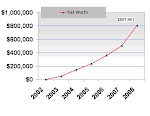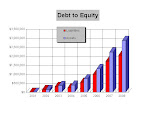Actually to be far more accurate I'm more addicted & fascinated with the real estate statistics out there as the market is absolutely fascinating. Why/how do property prices keep increasing when the rent fundamentals are so poor? It now takes something like 65-75% of your household income to service your home's mortgage payments. When the average house price is $715,000 (in Vancouver), that makes sense.
Rob Chipman is a realtor who runs a blog out there with great stats & great debates. I thought I would add it here as it has an interesting - some may say extremely dangerous - perspective on negative cash flow scenarios for the real estate investor. Here's what Rob says:
- I think Jeff (Brown) is saying that a cash flow neg property becomes, in effect, cash flow positive by applying interest expense, maintenance and depreciation deductions to your earned income. You change income tax paid today into capital gains tax deferred until you’re in a lower tax bracket (or never, if you don’t sell). While you may not find cash flow + properties in Vancouver for 10% down, they did exist in Greater Vancouver in the not too distant past (it was a challenge for some investors to get neg/neutral cash flow with past mortgage restrictions), and you can still get them today in other markets.
- Most property investors that I know do assume some sort of appreciation in the long term. Its not critical (you could buy in other areas, and tweak the numbers), but without growth leverage becomes moot.Is that speculation? I don’t think I’d go that far. I assume 5% long term around here. We generally do better than that. But, it is an assumption.
- The broad brush stroke idea is as follows: I pay out $1000 per month on the property (pit, maintenance, mgt, etc). I take in $750. I’m down $250. I write off interest, maintenance, management, taxes, and depreciation. That’s most of the $1000 (a little goes to principal repayment). So, I pay $250/month to my PM (property manager), who uses it to pay whatever shortfall I have. That’s my net loss. I add depreciation to increase it. I reduce my taxable income as a result. Given the right numbers and the right tax bracket, I could come out paying less tax by more than the $250 I’m losing on the property. That doesn’t take into account the potential capital gain, which most assume becomes more assured the longer you hold the property.
- (This is not an argument justifying purchasing a bad, money losing property so that you can write expenses off; rather, buy a good property, and finance it so that you incur expenses).
- I don’t have actual numbers handy, but many of my clients have done this, long term. They re-mortgage the property when interest expense gets too low, and use the borrowed money for other investments. It does work.
- You can even mortgage your revenue properties and use the funds on a principal residence (result of a court case between a lawyer and Rev Can - the judge sided with the lawyer).
- At some point in time you have to either pay tax on free cash flow (you probably don’t want 10 highly leveraged properties with a huge interest expense when you’re 80) or pay some capital gains on sale.
- One solution is to leverage several properties and then, when you approach retirement, sell individual properties and pay off other outstanding mortgages. You go from 10 leveraged properties to 5 free and clear properties and collect, say, $7,000 per month. Not bad if you don't have an indexed pension.
To be honest, this is something I've thought about since I'm quite young and have many years I can hold.
I've found great properties that I couldn't have afforded at the time without incurring neg cash flow. I watched them escape me and rise in value tremendously over the years. I missed the boat because I found that when it came down to making an offer, one simple question arose that I always seemed to ask myself. The question I tell myself: "Since I'm in for the long haul to have a safe & steady investment plan, how safe and steady is this plan if I'm tampering with the idea of paying money out of my pocket each month? Is this not putting my whole plan in jeopardy?". I guess Rob points out that the neg cash flow plan better take a good hard look at the positive offsetting tax consequences.
Did you notice the part about Rev Can allowing you to mortgage your investment properties then applying those funds to your principle residence? It caused quite a stir and some heated exchanges. I'll paste what Rob adds here:
- It is, or at least was, legal. Its common. (I don’t think its changed, but maybe Rev Can changed the rules last week). Its not a case of incurring interest expense on your home and deducting it from your income. Its a case of borrowing money for some kind of investment, and deducting the interest incurred.
- Court case example was a lawyer borrowing money from his partnership account, and using it to buy a house free and clear. He then mortgaged the house to replenish the partnership account. He called that a business expense and wrote it off. Rev Can said no way, he took them to court and he won.
- In real estate what happens is you say “I have rental property with equity in it. It breaks even. I want to buy a house, or reno my existing house. I’ll increase the mortgage on my rental props and use the money to pay for my principal residence. The interest expense is incurred because it allows me to hold the revenue properties. The alternative was to sell them. I borrowed the money to hold them. Therefore the deduction is fair.
- People sometimes say “Hold it, you’re really using the money for your principal residence”. That’s confusing doing one thing with doing another, and letting an unrelated activity deflect your focus. To hold the investment properties you have to borrow money. The interest is tax deductible. The fact that you are using other money to do other things is immaterial. Do a google search on principal residence interest deduction Canada and you’ll find lots of info on this. Its common.
- CRA was never happy with losing that case, so your point is well taken. That said, you can still write off interest and run the investment at neg cash flow. People have been doing it for years.
- And, as you rightly point out, tax advice should come from up to speed professionals.
Also, I differentiate between investors and flippers.


